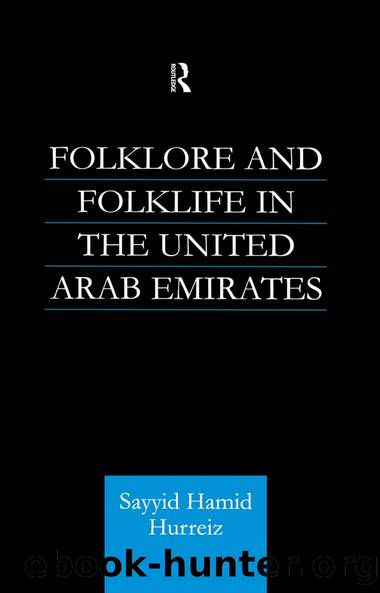Folklore and Folklife in the United Arab Emirates by Sayyid Hamid Hurriez

Author:Sayyid Hamid Hurriez [Hurriez, Sayyid Hamid]
Language: eng
Format: epub
Tags: Social Science, Ethnic Studies, General, Regional Studies
ISBN: 9781136849077
Google: UMldAgAAQBAJ
Barnesnoble:
Goodreads: 10405846
Publisher: Routledge
Published: 2011-02-22T00:00:00+00:00
INFANCY AND CHILDHOOD
There are various customs, ceremonies and traditional practices associated with the education and upbringing of infants and children. During infancy and early childhood most of those practices are in the form of socialization. At this stage, the extended family and peer groups used to play an important role in introducing the child to his or her natural and social environment, and in acquainting him gradually with his duties towards his family and community. Folklore in the form of lullabies, nursery rhymes, folk customs and childrenâs games. figure clearly in the upbringing and education of children. Some studies (e.g. Ghubash 1994: 130â9) deal with certain aspects of the use of folklore in socialization. Folk songs and childrenâs games contribute considerably to the socialization and upbringing of infants, children and youths. However, this contribution will be dealt with later in Chapter 8 devoted to the performing arts.
It cannot be claimed that the extended family or the use of folklore and cultural heritage still play an important role in socializing and educating the younger generations in contemporary UAE society as they used to do in the past. This is one of the areas which has witnessed considerable changes in modern and contemporary UAE society. The extended family has given up its previous role in educating and bringing up its infants and children, and the nuclear family is following the same path. Foreign maids and servants who come from various countries, mainly Asian, and who neither know nor care to know about UAE heritage are entrusted with the responsibility of bringing up UAE children. As expected, neither Islamic Arabic heritage nor local forms of UAE folklore find prominent positions in this new situation. To complicate things further, the role of peer groups in maintaining and promoting traditional heritage is also diminishing. Nowadays, most of the younger generations spend their leisure time in video clubs and electronic games centres rather than in practising children games or traditional sports.
As mentioned earlier in Chapter 3, children were sent to the muá¹awwaâ or muá¹awwaâa for education. Since this traditional education was discussed in detail in Chapter 3, the following paragraphs deal with certain traditional practices relevant to this chapter which is concerned with folk customs and beliefs and other ceremonies and rites related to them. One of the most notable ceremonies associated with childhood in traditional UAE society is al taḥmÄ«da which is also known as al tomÄ«na; al taḥmÄ«da is the traditional ceremony which is performed in honour of the student who has memorized and learnt the Qurâan by heart. It is similar to a graduation ceremony except that it is more colourful and memorable, not only for the young graduate, but also for his whole community.
The main feature in this ceremony is the procession in honour of the young graduate and in which all his colleagues, whether boys or girls, participate. They move around the whole city or village dressed in their best clothes while chanting religious songs and repeating verses loudly, thanking Allah for his grace and mercy.
Download
This site does not store any files on its server. We only index and link to content provided by other sites. Please contact the content providers to delete copyright contents if any and email us, we'll remove relevant links or contents immediately.
Cecilia; Or, Memoirs of an Heiress — Volume 1 by Fanny Burney(32558)
The Great Music City by Andrea Baker(32018)
Cecilia; Or, Memoirs of an Heiress — Volume 2 by Fanny Burney(31956)
Cecilia; Or, Memoirs of an Heiress — Volume 3 by Fanny Burney(31941)
We're Going to Need More Wine by Gabrielle Union(19045)
All the Missing Girls by Megan Miranda(16023)
Pimp by Iceberg Slim(14506)
For the Love of Europe by Rick Steves(14121)
Bombshells: Glamour Girls of a Lifetime by Sullivan Steve(14073)
Talking to Strangers by Malcolm Gladwell(13370)
Norse Mythology by Gaiman Neil(13363)
Fifty Shades Freed by E L James(13239)
Mindhunter: Inside the FBI's Elite Serial Crime Unit by John E. Douglas & Mark Olshaker(9339)
Crazy Rich Asians by Kevin Kwan(9290)
The Lost Art of Listening by Michael P. Nichols(7506)
Enlightenment Now: The Case for Reason, Science, Humanism, and Progress by Steven Pinker(7311)
The Four Agreements by Don Miguel Ruiz(6763)
Bad Blood by John Carreyrou(6621)
Weapons of Math Destruction by Cathy O'Neil(6279)
